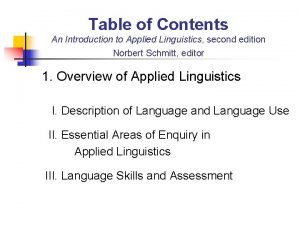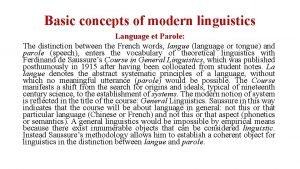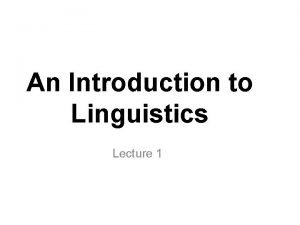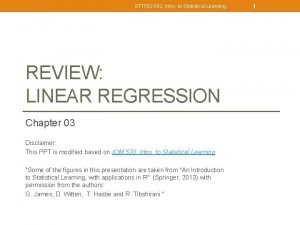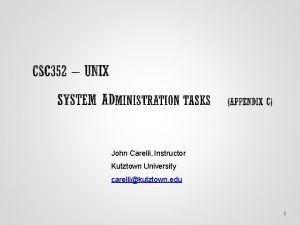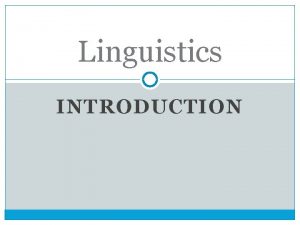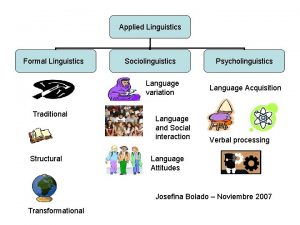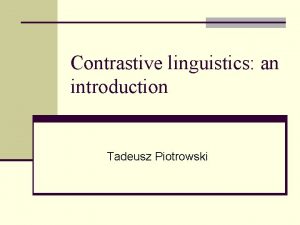Introduction to linguistics II FACULTY OF ENGLISH LANGUAGE



































- Slides: 35

Introduction to linguistics II FACULTY OF ENGLISH LANGUAGE AND LITERATURE G. TOGIA SECTION ΠΗ-Ω 28/10/2020

Today’s topics 2 Pragmatics: Implicatures. The co-operative principle. You can study these topics in: Dirven, R. & Verspoor, M. : Chapter 7. George Yule: Chapter 12.

Pragmatics IMPLICATURES Course title: Introduction to Linguistics II

Explicit and implicit meaning: Examples 4 Jane: Hello, are you going to the shop? Could you get me some milk? Peter: Of course. The usual, huh? Ben: Will you go to the cinema with me this evening? Ann: I have to study for an exam.

Implicature: definition 5 Implicatures are additional or different meanings from the expressed meaning. Distinction between conventional and conversational implicatures. The term conversational implicature was introduced by Grice, P. Logic and conversation, 1975.

Conventional implicature 6 Conventional implicatures always convey the same implicature, regardless of context. They are tied to particular linguistic expressions. But, even, therefore and yet. My friends were poor, but honest.

Conversational implicature 7 With conversational implicatures, what is implied varies according to the context of utterance. A: Can I check my email? B: The laptop is in the kitchen. (implicature: yes) A: Can I check my email? B: The phone line is off. (implicature: no)

Points to remember… 8 It is important to emphasise that: Implicatures are implied and not said (beyond the meaning of the words used). The same utterance may give rise to different implicatures in different contexts. Implicatures are cancellable or defeasible. A: Can I check my email? B: The laptop is in the kitchen, (implicature: yes) but I don’t trust you with it. (implicature: no)

Pragmatics THE CO-OPERATIVE PRINCIPLE (CP) Course title: Introduction to Linguistics II

Austin and Grice 10 Austin made the distinction between what speakers say and what they mean. Grice’s theory attempts to explain how a hearer gets from what is said to what is meant, from the level of expressed meaning to the level of implied meaning.

Grice and the CP 11 Grice’s theory is about how people use language. Hearers show some regularity in their production of inferences and speakers exploit this to imply something more than what is stated: Grice was the first to systematically account for this by positing the CP. The CP is a tacit agreement between speaker and hearer to cooperate in communication.

What the CP is not. . . 12 An ideal of fair and honest cooperation amongst human beings. The term ‘cooperation’ is not used in an everyday sense to refer to people’s feelings. It does not designate a prescriptive set of rules and regulations for human interaction.

The co-operative principle 13 Make your contribution such as is required, at the stage at which it occurs, by the accepted purpose or direction of the talk exchange in which you are engaged. Grice’s suggestion: In their everyday interaction people observe regularities which arise from rational considerations.

The maxims of conversation 14 Within the CP, Grice establishes four maxims of conversation, which concern different types of inferences (from the point of view of the hearer), or implicatures (from the point of view of the speaker): The maxim of quality. The maxim of quantity. The maxim of relevance (relation). The maxim of manner.

The maxim of quality This maxim requires that we only give information for which we have evidence. Make your contribution one that is true, specifically: (i) Do not say what you believe to be false. (ii) Do not say that for which you lack adequate evidence.

The maxim of quality: example 16 A: Who won the match yesterday? B: Manchester did. Implicature: Assuming that B is co-operative and provides information for which he has evidence, his reply is true and therefore Manchester won the match; otherwise, B would have provided a different answer.

The maxim of quantity This requires that the speaker provides all the necessary information s/he has for the present needs of the partner. (i) Make your contribution as informative as is required. (ii) Do not make your contribution more informative than required.

The maxim of quantity: example A: I’ve run out of petrol. B: There is a petrol station round the corner. Implicature: As far as the speaker knows, the station is open and also sells petrol. If neither of the two was true B would not have said so. Therefore, I can find petrol there. A: Have you read Dostoevsky’s novels? B: I’ve read some. Implicature: B hasn’t read all his novels, only some.

The maxim of relevance The maxim is very simple: Make your contribution relevant.

The maxim of relevance: example 20 A: Can I borrow 10 euros? B: My wallet is in the bedroom. Implicature: Provided B is co-operative and provides a relevant answer, I can borrow 10 euros. A: How are the trumpet lessons going? B: Not great, but I’d rather not discuss it now. Implicature: The trumpet lessons are not going so well.

The maxim of manner Be perspicuous, and specifically: avoid obscurity avoid ambiguity be brief be orderly

The maxim of manner: example 22 A. Do you love me? B. Of course I do. Implicature: provided that B is co-operative, s/he is giving me a clear, unambiguous answer; therefore, B loves me. The woman got out of her car and went straight into the office. Implicature: The woman got out of her car and then went to the office.

Points to remember. . . 23 The maxims are not rules that people have to follow in an interaction. People do not always follow these maxims in everyday interaction. Even when the maxims are violated, the hearer assumes that this is done on purpose and looks for particular inferences.

Points to remember. . . 24 What is at work here is: The hearer assumes that the speaker is being co-operative and, unless there is an indication to the contrary, the speaker: will tell the truth, will say as much as the occasion requires by estimating what is already known, will know what is being discussed, will make sure the hearer(s) understands her/him.

Pragmatics FLOUTING THE MAXIMS Course title: Introduction to Linguistics II

Flouting the maxims 26 The hearer draws inferences as to what the speaker implies in two distinct ways: When the speaker is observing the maxims, inferences will be quite straightforward: A: I need to check my email. B: The laptop is in the kitchen. When the speaker deliberately flouts the maxims and it is obvious that s/he is doing so, this prompts the hearer to look for a different meaning from what is explicitly expressed.

Flouting the maxims: definition 27 Some conversational implicatures are derived on the basis of a violation or flouting of the maxims. It arises when the speaker blatantly fails to observe a maxim but not with the intention of deceiving or misleading.

Flouting the maxims: example 28 A: How are we getting there? B: Well, we’re getting there in Dave’s car. Flouts the maxim of quantity (gives less information). Implicature: A will not be travelling with them.

Flouting the maxim of Quality 29 A: You know, many people here are depending on you. B: Great! That really is a relief… Implicature: B’s answer is sarcastic; she says something which is obviously untrue, thus implying that the opposite is true. The true meaning here is something along the lines of “That really stresses me out”.

Flouting the maxim of Quantity 30 A: Where does Mary work? B: Room 43 or Room 34. Implicature: B does not know which of the two places Mary works. A: What can you tell me about my son’s school performance? B: Your son is always well-dressed and he is never late for class. Implicature:

Flouting the maxim of Relation 31 A: Do you like your new flat? B: The flowers are looking great! Implicature: B does not like her/his new flat. Polonius: What do you read, my Lord. Hamlet: Words, words. Implicature: A: Are you coming to my party this weekend? B: It looks like it’s going to rain. Implicature:

Flouting the maxim of Manner 32 A. Do you love me? B. I’ll ponder on that matter soon and when an answer pops up, it will be delivered to you without haste. Implicature: B is being unnecessarily ambiguous and confusing; therefore, B either does not know or s/he does not want to answer the question. (a couple has just had an argument and are having supper with their small children) A: Do you still think I was wrong? B: Oh, just go to H-E-L-L. Implicature:

Cancelling implicatures 33 An implicature can be cancelled. This allows the speaker to imply something and then deny that implicature. A letter to a newspaper shortly before Mrs Thatcher resigned as a Prime Minister in November 1990: For the sake of the country the PM should hold on until the summer. This is no time of year for street parties. Exercise 1

Summary 34 The co-operative principle: Grice’s principle for explaining how conversational implicatures arise. The CP is supported by four maxims: Quality, quantity, relevance and manner. Implicatures: implications following from the maxims. They are additional or different meanings from the expressed meaning. Grice distinguished between conventional and conversational implicatures.

Next week. . . 35 Text Linguistics – Discourse Analysis: Introduction. Cohesion and coherence.
 A concise introduction to linguistics
A concise introduction to linguistics Traditional linguistics and modern linguistics
Traditional linguistics and modern linguistics History of applied linguistics
History of applied linguistics Faculty introduction speech
Faculty introduction speech What is cross cultural communication definition
What is cross cultural communication definition The study of language by george yule notes
The study of language by george yule notes An introduction to applied linguistics norbert schmitt
An introduction to applied linguistics norbert schmitt Cognitive linguistics: an introduction
Cognitive linguistics: an introduction Linguistics is the scientific study of
Linguistics is the scientific study of Parole und langue
Parole und langue Langue definition in linguistics
Langue definition in linguistics Signing naturally homework 2.9 names and tidbits
Signing naturally homework 2.9 names and tidbits Language and the brain in linguistics
Language and the brain in linguistics A level english language language change
A level english language language change University of split faculty of maritime studies
University of split faculty of maritime studies University of bridgeport computer science
University of bridgeport computer science University of bridgeport computer engineering
University of bridgeport computer engineering Alamo colleges salary schedule
Alamo colleges salary schedule Hahnville high school powerschool
Hahnville high school powerschool Importance of faculty in higher education
Importance of faculty in higher education Hubert kairuki memorial university faculty of medicine
Hubert kairuki memorial university faculty of medicine 002
002 Semmelweis university faculty of medicine
Semmelweis university faculty of medicine Penn state neurosurgery
Penn state neurosurgery Mercy college adjunct positions
Mercy college adjunct positions Faculty of medicine nursing and health sciences
Faculty of medicine nursing and health sciences Lee kong chian faculty of engineering and science
Lee kong chian faculty of engineering and science King abdulaziz university faculty of medicine
King abdulaziz university faculty of medicine Carelli
Carelli Fsu computer science department
Fsu computer science department Mendel university - faculty of business and economics
Mendel university - faculty of business and economics Umd ee
Umd ee Factors influencing faculty staff relationship
Factors influencing faculty staff relationship Nit calicut chemistry department
Nit calicut chemistry department Czech technical university in prague civil engineering
Czech technical university in prague civil engineering Faculty 180 ecu
Faculty 180 ecu






